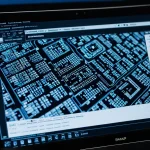Prominent UK Computing Hardware Innovations
The UK has steadily emerged as a hub for hardware innovation in computing, propelled by a combination of academic prowess and industry expertise. Recent UK technology breakthroughs highlight a focus on compact, energy-efficient processors and next-generation memory technologies. British computing advances encompass not just traditional semiconductor design but also pioneering explorations in quantum hardware, which promise transformative changes in processing power.
Key institutions like the University of Cambridge and Imperial College London collaborate closely with companies such as Arm Holdings and Graphcore, both leaders in developing custom chips optimized for modern workloads. For example, Graphcore’s Intelligence Processing Unit (IPU) exemplifies UK hardware innovation designed for machine learning tasks, delivering remarkable efficiency gains compared to standard CPUs.
Also to discover : How Does Computing Hardware Influence UK Technology Education?
Moreover, UK startups have introduced emerging innovations in neuromorphic computing, mirroring neural networks with specialized hardware. These breakthroughs enable faster data processing and lower power consumption, essential for scaling AI applications globally.
In summary, British computing advances are not limited to incremental improvements but include bold strides toward reshaping computing architectures. This synergy between academia, industry, and government-backed initiatives is crucial for sustaining the UK’s position at the forefront of hardware innovation.
In the same genre : How can businesses leverage UK computing hardware for competitive advantage?
Impact on Artificial Intelligence and Data Processing
The AI hardware UK sector has benefited significantly from targeted innovations that enhance machine learning performance. Specialized processors like Graphcore’s Intelligence Processing Unit (IPU) exemplify recent UK technology breakthroughs, delivering superior efficiency and speed in training and inference tasks compared to generic CPUs. These advances allow data centers to process vast datasets more rapidly, improving scalability essential for modern AI applications.
UK data center technology increasingly incorporates such machine learning accelerators, reducing energy consumption while boosting computational throughput. This balance addresses two critical challenges: growing AI model complexity and sustainability concerns. Consequently, British computing advances are shaping more environmentally friendly and powerful infrastructures.
Real-world applications highlight the practical impact of these innovations. For example, healthcare diagnostics utilize UK-designed AI hardware to analyze complex imaging data faster, facilitating timely and accurate decisions. Similarly, financial institutions leverage these processors to detect fraud in real time across massive transaction streams. These use cases show how UK hardware innovation translates directly into enhanced AI capabilities, influencing multiple sectors with agility and precision.
Prominent UK Computing Hardware Innovations
The UK has spearheaded recent UK technology breakthroughs through cutting-edge developments in processor design, memory architecture, and specialized computing units. Notably, British computing advances manifest in energy-efficient CPUs that balance power consumption with performance, critical for modern computing demands. The University of Cambridge and Imperial College London continue to pioneer research translating into practical hardware solutions, collaborating closely with industry leaders like Arm Holdings, whose designs power billions of devices globally.
Among standout examples of UK hardware innovation is Graphcore’s Intelligence Processing Unit (IPU), which revolutionizes parallel processing for machine learning workloads. This bespoke chip architecture optimizes data flow and computational concurrency, offering marked improvements in speed and efficiency over traditional silicon chips. Meanwhile, startups in the UK push the envelope by developing neuromorphic chips that mimic neural networks, thus unlocking more natural AI data processing methods.
These British computing advances underscore the thriving ecosystem linking academia, startups, and established companies. This synergy fuels innovation cycles, allowing rapid adaptation to emerging computational requirements. Together, UK institutions and corporations foster a vibrant landscape in hardware design, continually elevating the nation’s standing in global computing technology.
Prominent UK Computing Hardware Innovations
Recent UK technology breakthroughs showcase a vibrant landscape of UK hardware innovation, reflecting strategic efforts across academia and industry. Among the most notable British computing advances is the development of neuromorphic chips, which mimic brain-like processing to improve efficiency in AI workloads. These chips exemplify the UK’s unique focus on designing hardware that goes beyond conventional silicon architectures.
Key institutions such as the University of Cambridge continue driving advances in quantum hardware, while companies like Arm Holdings innovate by creating energy-efficient, high-performance processors widely adopted in mobile and embedded systems. For instance, Arm’s chip designs power billions of smart devices globally, underscoring the reach of UK hardware innovation in everyday technology.
Additionally, startups are rapidly advancing bespoke silicon solutions tailored to AI and edge computing. Graphcore’s Intelligence Processing Unit (IPU) is a prime example, delivering significant speed gains in machine learning tasks compared to traditional CPUs. This reflects a broader trend within British computing advances: combining deep research expertise with agile commercial development to produce pioneering hardware.
Together, these examples form a dynamic ecosystem where practical applications and theoretical breakthroughs coexist, reinforcing the UK’s role as a leader in cutting-edge computing hardware technology.
Prominent UK Computing Hardware Innovations
In the realm of UK hardware innovation, recent breakthroughs demonstrate a compelling blend of advancing traditional semiconductor capabilities and exploring novel architectures. British computing advances include standout developments in energy-efficient processors, which combine high performance with reduced power requirements—vital for sustainable computing at scale. One prominent case is Arm Holdings, whose chip designs are foundational in billions of devices worldwide, underscoring the UK’s global impact.
Additionally, UK institutions like the University of Cambridge and Imperial College London continue to drive hardware research, producing innovations geared toward next-generation computing. These advances often translate directly into commercial products, as seen with Graphcore’s Intelligence Processing Unit (IPU), a prime example delivering optimized machine learning performance.
Startups contribute to the dynamic landscape, focusing on neuromorphic computing and specialized coprocessors, pushing boundaries beyond conventional designs. The synergy among academia, startups, and industry accelerates innovation cycles and cements the UK’s role as a leading hub for recent UK technology breakthroughs in computing hardware, supporting a diverse ecosystem that effectively shapes future global technology trends.
Prominent UK Computing Hardware Innovations
The UK consistently leads in recent UK technology breakthroughs, particularly in designing versatile and energy-efficient processors. Among the most significant British computing advances are developments in custom silicon tailored for AI workloads, such as Graphcore’s Intelligence Processing Unit (IPU). This chip exemplifies UK hardware innovation by enabling highly parallel processing and improved data throughput, far surpassing conventional CPU architectures in machine learning tasks.
Key institutions like the University of Cambridge and Imperial College London collaborate with industry giants such as Arm Holdings, whose innovative chip designs power countless mobile and embedded systems worldwide. These partnerships accelerate innovation cycles, ensuring new research translates swiftly into practical applications.
Additionally, the UK startup ecosystem nurtures breakthroughs in neuromorphic computing and quantum hardware. Neuromorphic chips, which simulate neural networks at the hardware level, deliver more natural AI computation with reduced power demands. This approach represents another level of British computing advances, enhancing AI efficiency and scalability beyond traditional methods.
Together, these elements demonstrate a dynamic landscape of UK hardware innovation where academic excellence meets industry expertise, driving forward hardware technologies essential to future computing challenges.
Prominent UK Computing Hardware Innovations
The landscape of UK hardware innovation reveals a series of impactful recent UK technology breakthroughs that continue to redefine computing capabilities. Among the most notable British computing advances are focused developments in advanced processor architectures designed for energy efficiency and high throughput. Arm Holdings remains a cornerstone, with its designs embedded in billions of devices worldwide, reflecting the global reach of the UK’s hardware expertise.
Innovative startups like Graphcore push the envelope by creating specialized chips such as the Intelligence Processing Unit (IPU), which accelerates machine learning workloads significantly more than conventional CPUs. These chips implement novel dataflow architectures, representing a sharp departure from traditional designs. Additionally, British computing advances extend into neuromorphic computing—an emerging field focused on mimicking the human brain’s neural networks through dedicated hardware to boost AI efficiency and reduce power consumption.
Academic institutions, including the University of Cambridge and Imperial College London, act as innovation incubators, frequently collaborating with industry leaders. This collaboration results in spin-off technologies and commercial products that exemplify the UK’s pioneering role in computing hardware. Together, these elements showcase how the UK’s ecosystem effectively stimulates continual innovation and cements its position as a global hardware innovation hub.
Prominent UK Computing Hardware Innovations
The UK’s hardware landscape is characterized by recent UK technology breakthroughs that push the boundaries of computing performance and efficiency. Noteworthy British computing advances include custom silicon designs optimized for AI workloads, with Graphcore’s Intelligence Processing Unit (IPU) exemplifying UK hardware innovation by delivering unparalleled parallel processing capabilities. This chip’s architecture enhances throughput and energy efficiency, setting new standards for machine learning hardware.
Key institutions such as the University of Cambridge and Imperial College London play instrumental roles in recent UK technology breakthroughs, focusing on both traditional semiconductor improvements and emerging fields like quantum and neuromorphic computing. Their collaborations with industry leaders like Arm Holdings foster a fertile environment for British computing advances, ensuring that academic research swiftly transitions into commercial hardware products powering billions of devices globally.
Within this vibrant ecosystem, startups contribute cutting-edge developments in neuromorphic chips, mirroring neural structures to achieve more efficient AI computations. This synergy between academia, established companies, and startup ventures exemplifies the robust cycle of innovation, cementing the UK’s position at the forefront of global UK hardware innovation.





